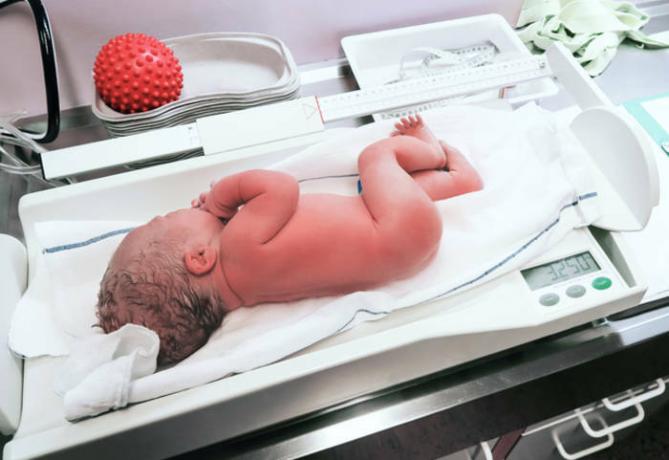What weight loss in babies is considered normal. What can cause excessive weight loss. How to manage breastfeeding so that your baby gains weight normally
The first thing that the mother is told after giving birth is the height and weight of the baby. From this moment and up to a year, these indicators will become the most important marker of the child's health and development. According to WHO recommendations, on average, a baby should gain about 500-600 g per month. However, it happens that instead of gaining weight, the weight goes somewhere. Why does an infant lose weight, when and what weight loss is considered the norm, and in which case is it necessary to sound the alarm and go to the doctor? A breastfeeding consultant told about this on her Telegram channel Olga Tsyganok
Weight loss after birth: when and how much

After birth, a baby can lose up to 10% of weight / istockphoto.com
After birth, two indicators related to weight are recorded in the child's medical documents: the weight with which the baby was born, and the weight at discharge from the hospital. Most often, the first digit is slightly higher than the second. That is, the child loses weight in the first three days of life. It is premature to panic and think about supplementation in such a situation, because in medicine this is considered the norm, says Olga Tsyganok.
First, a newborn will lose 6-8% of its weight immediately after birth. This is due to the fact that amniotic water evaporates from the child's body, and meconium (original feces) is also released. In addition, the umbilical cord dries up - these are grams, which also need to be considered as a cause of weight loss. It turns out that the baby does not lose weight, but gets rid of the excess. However, this process must also follow certain rules.
According to Olga Tsyganok, weight loss up to 10% of the indicator with which the baby was born is considered normal after birth. That is, for a child weighing 3.5 kg, it is permissible to lose up to 350 g. If the child has lost a lot more weight, you need to establish the cause with a doctor. The maximum weight loss, as a rule, is observed in a child 3-4 days after childbirth, but by 6-10 days the weight should be restored. It is acceptable if the child loses weight within 10 days after giving birth, but again, he should not lose more than 10% of the indicator with which he was born.
The child continues to lose weight: what to do

Improved feeding quickly normalizes baby's weight / istockphoto.com
If the weight loss is not within acceptable limits, and baby continues to lose weight, first you need a pediatrician consultation. There are quite understandable reasons that can provoke excessive weight loss in a baby. For example, premature birth: a child who was born prematurely, most often in the first weeks of life, loses up to 15% of its birth weight. It is more difficult for such children to adapt to life "outside", so the weight goes away faster, and it takes longer to recover.
Also, prolonged or difficult labor, caesarean section, macrosomia (when a child is born with a large body weight). In addition, Olga Tsyganok notes various interventions in the childbirth process (epidural anesthesia or injections with oxytocin): they can affect the whole child at birth in a big way, respectively, and he will lose later more.
Congenital abnormalities that can cause permanent weight loss in a child are most often developmental delays. They are quite rare (less than 5% of cases), but they must be excluded. In the event that the pediatrician has not found any diseases or infections that can lead to weight loss, the reason is obvious: the baby simply does not finish eating.
In this situation, the child is usually assigned supplementary food. Do not be afraid of him, warns Olga Tsyganok. This will allow the baby to “wait out” the time until the mother establishes breastfeeding without much harm to health. For a faster effect, it is better to contact a certified HW specialist. The consultant will without fail check:
- baby's hypoglossal frenum (if the pediatrician has not done this)
- how developed is the sucking reflex in a child
- how breastfeeding is organized (frequency and duration of breastfeeding)
- does mom have enough milk
As a rule, the main recommendation here will be more frequent attachment of the baby to the breast. The feeding regime is not needed here, and feeding on demand is not always effective. Offer your baby to the breast every hour, even if he is not visually hungry yet. And do not alternate breasts too often: for weight gain, it is better if the baby empties it completely, thereby getting to the more fatty "rear" milk. There is a simple rule: you can give a second breast to a baby only when he has not eaten with the first. How to understand it: by greedy grabbing of the nipple, the baby will be nervous and possibly even cry
If your baby falls asleep at the breast 10 minutes after starting feeding, do not be afraid to wake him up. The sucking power in babies of the first month of life is still very weak, so it is unlikely that he will be able to eat in such a short time. And do not neglect night feedings: the baby can adapt to this, and sleep soundly, even when he is hungry. Therefore, at first, it is advisable to set an alarm and wake up for feeding every three hours. Perhaps this will exhaust you, but it will give a very good effect for establishing lactation.
You will also be interested to read:
How much breast milk should a baby eat in one feeding: table
Baby chair: what not to be afraid of in a baby diaper

